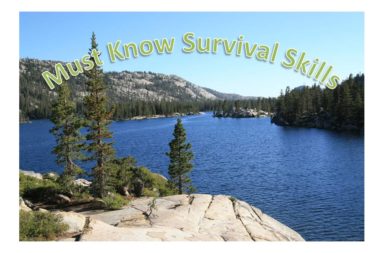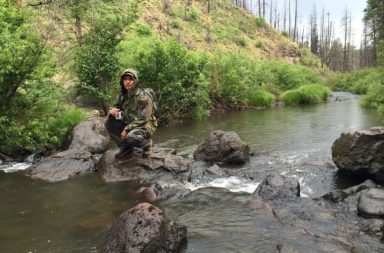It’s easy to get overwhelmed reading the never-ending news articles about all the terrible things happening around the world. From natural disasters to man-made catastrophes, the bad news just keeps coming at a furious pace. And for those of us who live a preparedness lifestyle, it often feels like no matter what we do, it’s never enough.
This can often lead to some folks becoming paralyzed with doubt and indecision when faced with conflicting choices. This state of mind is sometimes referred to as prepper’s fatigue, and it happens when people become overwhelmed by the multitude of ever-present threats, coupled with the abundance of complicated and often impractical “preparedness” advice that can be found just about everywhere.
While prepper’s fatigue is understandable, if left unchecked, those feelings of helplessness and frustration can cause some people to give up and completely abandon their efforts. Not a good thing, considering just how important those efforts can be.
If any of this sounds familiar, you’re not alone. But don’t give up hope. In this article we breakdown how prepper’s fatigue can manifests itself, and more importantly how you can stay focused on your preparations, without feeling overwhelmed.
Prepper’s Fatigue Can Happen to Anybody
I recently heard a fellow prepper saying “How can one person possibly prepare for all the potential threats?”
I feel as though I should be doing more, but considering all the uncertainty, I’m not quite sure what more I can do, or even if what I’m doing is correct or effective.”
These feelings are quite common. The frequency, and growing severity of perceived threats, combined with the lack of control over many of these situations, and the uncertainty on how to respond can lead to sometimes lead to panic, frustration, anger, and crushing feelings of helplessness.
While people are constantly encouraged to prepare for disasters, the standard recommendations are usually anemic and typically lead to confusion more than anything else. Without a clear understanding of the risks, and how to prepare for those risks, most preparedness plans are doomed to fail right from the start.
How to Deal With Prepper Fatigue
The first step in dealing with a problem is to recognize and understand it. The following guidelines and suggestions can be very effective in dealing with the negative feelings and keeping your attention firmly focused on what really matters – effectively managing and improving your plans and preparations.
- Ignore the hype, fear mongering and other such nonsense. There is never a shortage of “survival experts” urging their audience to prepare for the “End.” Not surprisingly, there is usually a product for sale in connection with their apocalyptic warnings. It’s all too easy to buy into these shenanigans since the messages always seem to contain at least a kernel of truth, just enough to make it sound credible and convincing. While it’s important to stay informed and keep an open mind, it’s essential to also develop a nose for identifying the charlatans, and to just say “No.” Most importantly, never allow any of their nonsense to distract you from your core efforts – focusing on survival basics.
- Forget perfection. Nothing you can do will ever be 100%, nothing. Your goal should be to make the very best preparations and plans within your abilities and financial means, not to make the “perfect plans.” As you expand your knowledge base, you will also gain a better understanding of what you really need to address for your particular circumstances and you’ll make improvements and adjustments. The very worst thing you can do is to delay starting your efforts until everything is just right. Get it done, and refine your efforts as you go along.
- Focus on the survival basics. These are the things that really matter and that will help keep you alive in just about any survival scenario – food, water, first aid/medical, sanitation/hygiene, security/self-defense, and knowing when to get out and when to stay put. There are of course many more preparations that you should make, but if you need to get started somewhere and have limited time and money, get started with the basics.
- Slow and steady. Preparedness is a lifestyle and a process that evolves over time. Don’t expect to sit down over a long weekend and write out a viable, fully functional survival plan, or to run out to your big box retailer and buy all the things you need in one trip. Part of the process involves trial and error, and this process can never be rushed. Trying to do everything at once is not only ineffective, but it will only increase your levels of stress and anxiety. Building and improving on your efforts over time is the preferred method and over the long run will yield the bets results.
- Test your plans and your preparations often. Untested plans and preparations are at best a gamble – when the time comes they may, or may not work as you anticipated. Testing helps you find the flaws, and provides you with valuable data to make adjustments. You also test your plans and preps to help you gain confidence.
- Keep it reasonable. Preparing a survival plan, storing food, water and medical supplies, cultivating useful skills, and being prepared to defend yourself and your family is reasonable. Planning to bug-out on a moment’s notice to live off the land by hunting and killing zombies along the way is a fantasy. Survival fiction and apocalyptic fiction makes for great entertainment and can be lots of fun, but it’s just that – entertainment.
- Maintain balance. Life is all about maintaining balance. There are lots of bad things happening around the world, but it’s not all gloom and doom. You should never allow yourself to focus on the negative to the exclusion of all else. Don’t hide your head in the sand, but remember to live your life, enjoy those precious moments with friends, family and especially with the people you love. Live your life to the fullest, and enjoy yourself.
Stay Aware
An important part of being prepared, is being aware of all the things going on around us, and accepting that any of those situations can potentially affect us in very negative ways. Whether it’s a storm, a financial collapse or an act of terrorism, there is a common denominator – these events are all well outside our control.
No matter what any of us may do, bad things will happen, and usually when we least expect it. The only thing we can do is to stay alert and aware, and make reasonable, rational preparations, without fear, panic or desperation. This also means maintaining balance. Plan for the worse of circumstances, but don’t forget to also enjoy the best of times.


